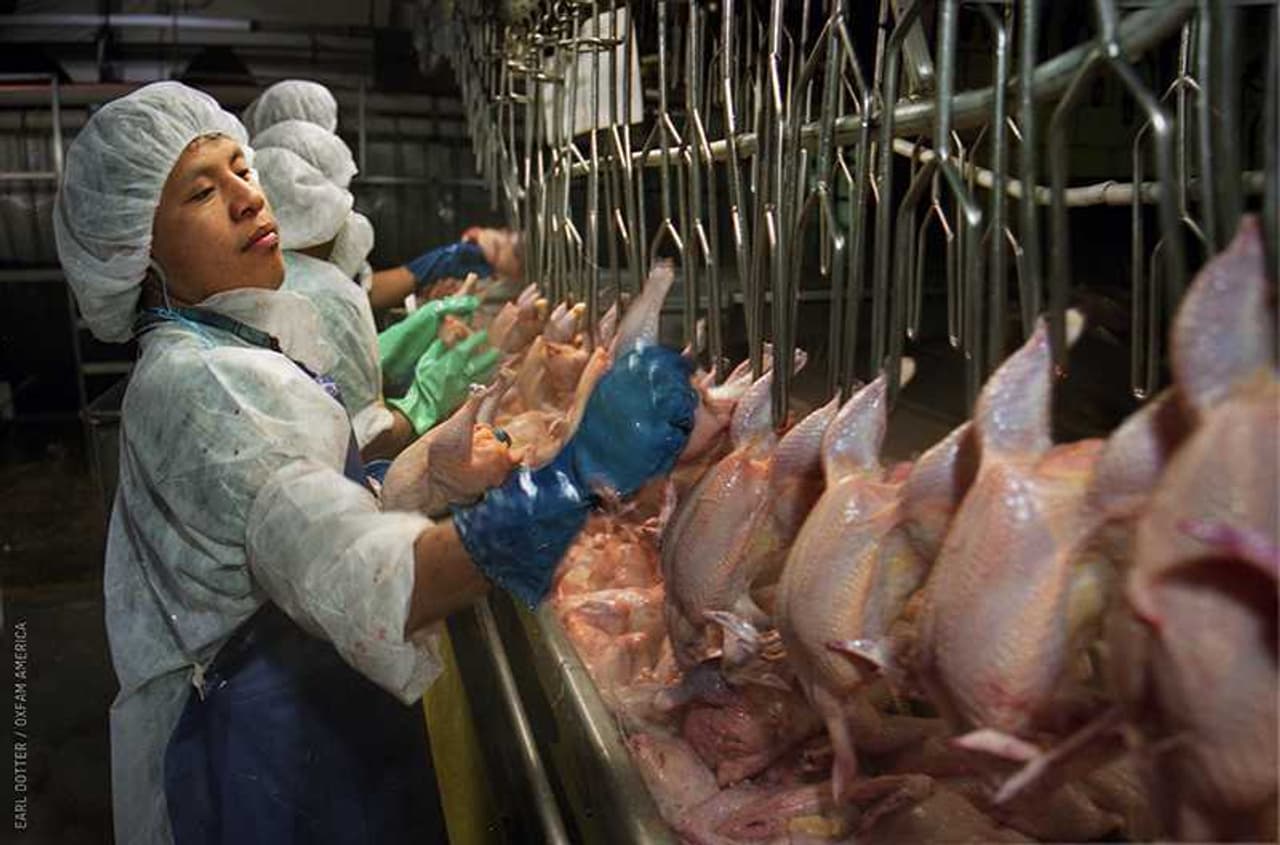
Dirty US meat could flood into UK after a Brexit trade deal
Unpublished US inspection reports reveal “deeply worrying” hygiene failings at US meat plants
Thousands of shocking hygiene violations in US meat production have been revealed in unpublished US documents, a joint investigation by the Bureau and the Guardian has found.
The revelations will reignite fears that dirty US meat could flood into Britain if strict food safety standards aren’t maintained after Brexit, leading experts and MPs have warned. This follows last year’s so-called “chlorinated chicken” row.
Our investigation has revealed a catalogue of hygiene failings in recent years in some major US meat plants producing poultry, beef and pork products. These include breaches relating to the contamination of carcasses, inadequate cleaning, insanitary conditions and other failings of key hygiene standards.
US campaigners are calling for a change in the law, which currently allows meat with salmonella to be sold. One in seven of the US population contracts a food-borne illness every year at present, compared to just over one in seventy in the UK.
Unpublished US government records highlight numerous specific incidents. These include:
- Dirty chicken, soiled with faeces or having been dropped on the floor, being put back onto the production line after being rinsed with chlorine
- Diseased poultry meat - that had been condemned - found in containers used to hold edible food products
- Pig carcasses piling up on the factory floor after an equipment breakdown, leading to contamination with grease, blood and other filth
- Meat destined for the human food chain found riddled with fecal matter and abscesses filled with pus
- High power hoses being used to clean dirty floors next to working production lines containing food products
- Factory floors flooded with dirty water after drains became blocked by meat parts and other debris.
Make change possible
Investigative journalism is vital for democracy. Help us to expose injustice and spark change
Click here to support usFood safety campaigners said some of the hygiene breaches could risk the spread of bacteria that can cause food poisoning illnesses, such as salmonella. This affects about a million people each year in the US, with around a third of cases linked to meat and poultry.
Internal records, known as non compliance reports, were compiled by the Food Safety Inspection Service (FSIS), which regulates US meat production.
Data obtained by The Guardian and the Bureau details more than 15,000 violations at 13 large red meat and poultry plants between 2015 and 2017. This represents 150 violations a week.
Separate documents reveal frequent failings at 24 plants operated by Pilgrim's Pride, one of America's largest poultry processors. The firm recently bought the British chicken giant, Moy Park. The firm is, in turn, owned by JBS, the world’s largest meat processing company.
More than 36,000 individual regulatory violations, numbering on average nearly 50 a day, were documented at the plants between 2014 and 2016.
Thousands of similar violations were recorded at ten pork-producing plants, including several run by Swift, which is also owned by JBS, over a five year period up until 2016, other documents show.
The findings highlight for the first time the widespread bad practices in parts of the US meat industry. This, following on from the uproar sparked by the “chlorinated chicken” row last year, highlights the potential risks to UK consumers if a widely expected US trade deal goes ahead without safeguards to guarantee standards.
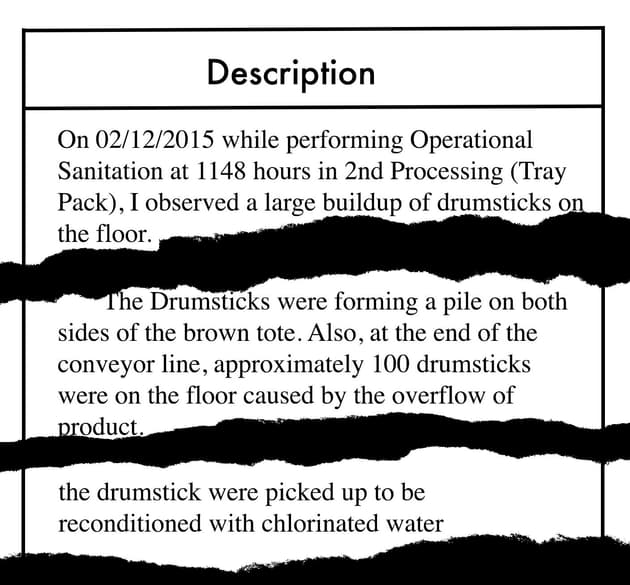 Screenshot of unpublished FSIS inspection report
Screenshot of unpublished FSIS inspection report
The data we have obtained so far relates to just 47 of the largest US meat plants, which number around 6,000, which are regularly inspected by FSIS. However, the data provides a chilling snapshot of hygiene issues that are rarely aired in public and which experts warn could represent just the tip of the iceberg.
Food safety experts and MPs said the findings underscore the potential risks to consumers, both here and in the US. “These figures are sobering reminders of the risks to UK public health if the UK crashes out of the EU’s food safety regime into the arms of Uncle Sam”, said Tim Lang, professor of food policy at London’s City University.
“British consumers must not be tantalised by offers of notionally cheaper US or international meat. Cheap meat isn’t cheap. The lamentable figures in this study remind us that big plants generate big problems when they go wrong”, he added.
Erik Millstone, professor of science policy at Sussex University, warned: “The latest revelations provide extra reasons for those, like me, who argue that Brexit should not be used as an excuse to lower UK food safety standards; on the contrary the government should seize the opportunity to improve food safety in the UK, not allow it to deteriorate.”
Kerry McCarthy MP, who served as shadow secretary of state for Environment, Food and Rural Affairs until 2016, called for urgent reassurances from both the UK’s Food Standards Agency (FSA) and “the top of Government”, so that standards would not be allowed to slip as trade negotiations get underway.
“We cannot allow this to be a race to the bottom. We should insist the US raises its standards, and guarantees food safety, before we are prepared to allow in US meat imports”, she said. The MP said she has written to Environment Secretary, Michael Gove MP, and Liam Fox MP, the Trade Secretary, to raise the matter.
The meat giant JBS, which owns Pilgrim’s Pride and Swift Pork, said in a statement that all of the incidents highlighted at their plants were addressed immediately and that no consumers were put at risk.
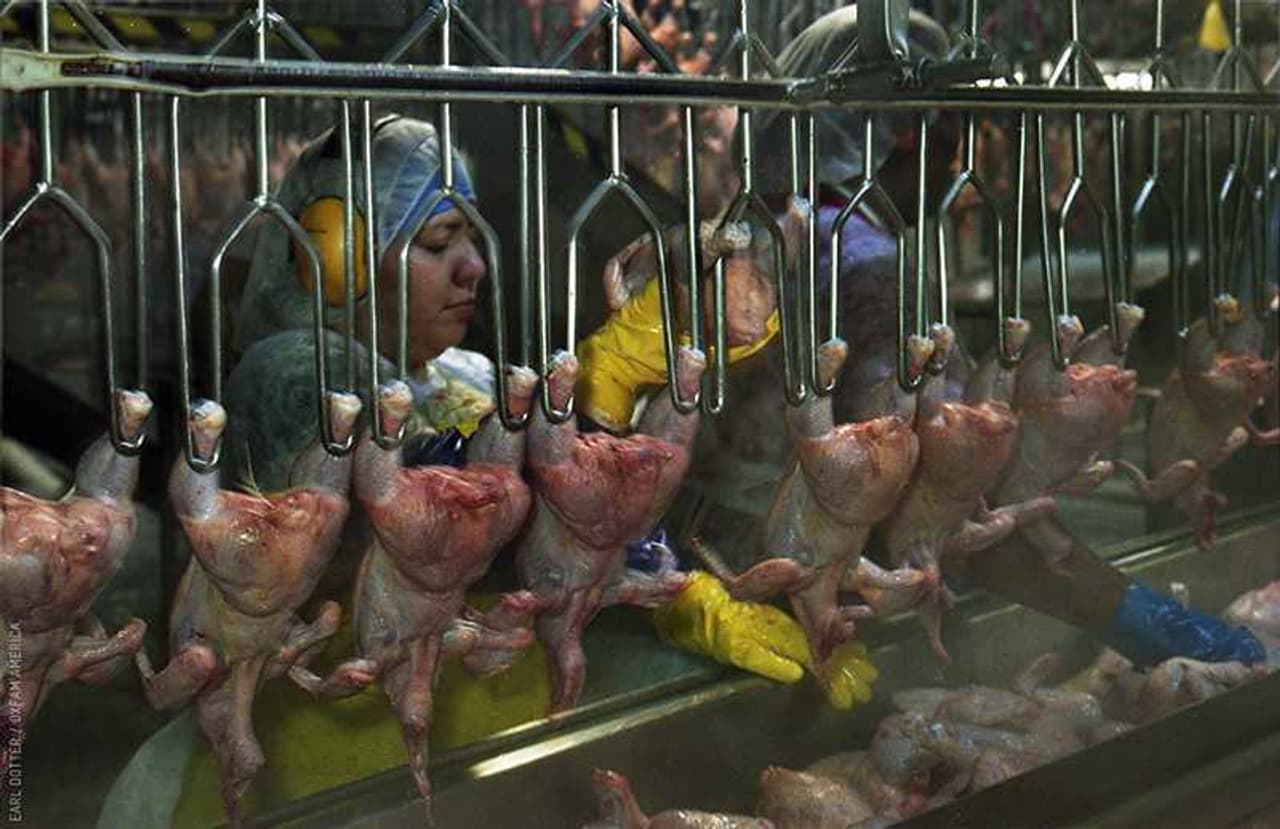
Analysing the violations
The Guardian and the Bureau analysed hundreds of pages of unpublished FSIS records detailing violations at some plants operated by Pilgrim's Pride. The company is one of the US's largest poultry producers, slaughtering 34 million birds each week and providing one in five of the chickens produced in the country.
The records detail numerous deficiencies and bad practices at different stages of the production process.
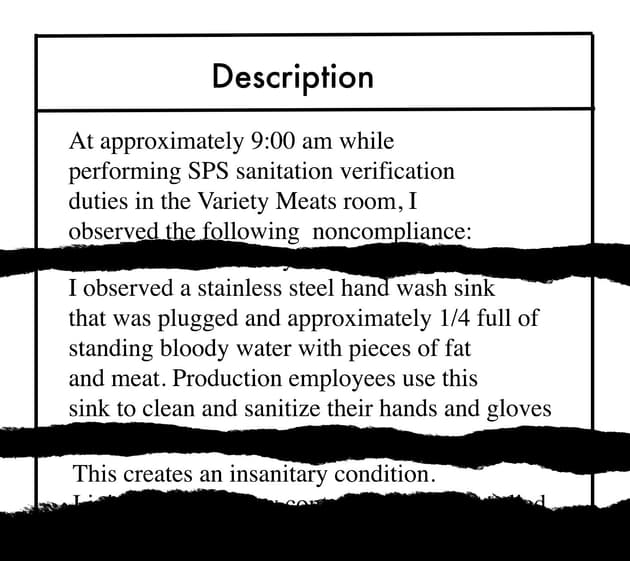 Screenshot of unpublished FSIS report
Screenshot of unpublished FSIS report
In one incident recorded in a tray packing department, an inspector observed “approximately 100 drumsticks on the floor. The drumsticks were forming a pile on both sides of the brown tote [a container for catching excess products].” Plant employees were instructed to pick the drumsticks up “to be reconditioned with chlorinated water”. The records indicate a similar incident had occurred previously.
The records also highlight an incident at the plant in which diseased meat, which is condemned from entering the human food chain, was placed in a container designed for holding meat intended for human consumption. An inspector discovered “carcasses of poultry showing evidence of septicemic disease... carcasses showing evidence of having died from other causes than slaughter... guts of carcasses, poultry carcasses with heads attached”, before having the condemned items removed.
A similar incident was recorded at the plant, in which contaminated breast meat was seen being put into a container assigned for holding meat for human consumption.
Meat soiled with fecal matter was also recorded, with an inspector noting: “I observed a poultry intestine in the liver bin. The intestine was approximately 6.5 inches long and had visible faeces oozing out both ends.” The incident resulted in the livers being condemned.
At another Pilgrim's Pride plant, the records reveal how deficient equipment led to a carcass becoming contaminated with faeces. “I observed one of my ten test birds with a spot of fecal matter on the exterior of the right thigh. The spot of fecal was… brownish green in color and had a pasty consistency”, an inspector notes. The affected bird was “retained by management for review then sent to reprocessing for reconditioning with chlorinated water”. Similar carcass contamination had been recorded before.
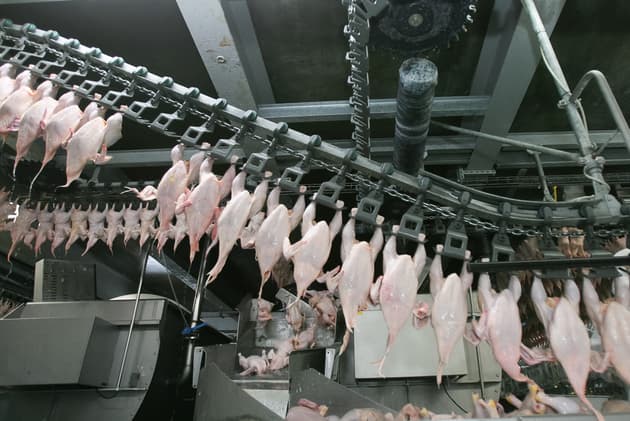 Stock image of a poultry production line
Photograph: Shutterstock
Stock image of a poultry production line
Photograph: Shutterstock
FSIS records also highlight numerous violations at meat plants producing pork. In an incident recorded at a plant run by Swift Pork, 48 pig carcasses were found to have fallen on the floor because of defective equipment. This led to contamination with “black trolley grease, floor grime and bloody smears”.
The records note: “The line was stopped for about fifteen minutes. The carcasses were sent to be trimmed first then steam vacuumed with 180 degree water.”
On another occasion, an employee was found to be cleaning the factory floor whilst meat products were on an adjacent conveyor belt, creating a mist that could contaminate the meat. “This mist is contaminated by the inedible debris and... comes into contact with edible product”, an inspector observes.
In a separate incident, a pig's head was found to have partially covered a drain, leading to “bloody waste water filling the area”. This, and another blockage caused by a buildup of skin, led to dirty water flooding other areas. “Because of the plugged drains, an insanitary condition was created; the bloody water in the walkway could be splashed and carried throughout the kill floor after employees walked through the puddle,” an inspector wrote.
In a different part of the factory, inspectors found a stainless steel hand wash sink “plugged and approximately [one-quarter] full of standing bloody water with pieces of fat and meat. Production employees use this sink to clean and sanitize their hands and gloves...This creates an insanitary condition.”
In a statement, JBS said all of the violations recorded were “immediately addressed” and that consumers were never put at risk. “The U.S. meat and poultry sector is one of the most highly regulated industries in America”, said Al Almanza, JBS’s global head of food safety and quality assurance, who has previously headed the regulator, FSIS. “Non-compliance reports are issued by USDA inspection personnel to document when an establishment has not met a specific regulatory requirement. However, the vast majority of non-compliance issues are addressed immediately and have no impact on food safety.”
“All of the documented incidents regarding JBS [Swift Pork] and Pilgrim’s were immediately addressed by our facilities. None of these incidents put anyone at risk or resulted in any adulterated product released into commerce. Food safety is achieved by implementing processes that consistently detect and correct issues before products are released into commerce. Our team at JBS and Pilgrim’s is committed to the highest food safety standards and we partner with USDA each and every day to ensure that consumers can enjoy safe and quality products with confidence.”
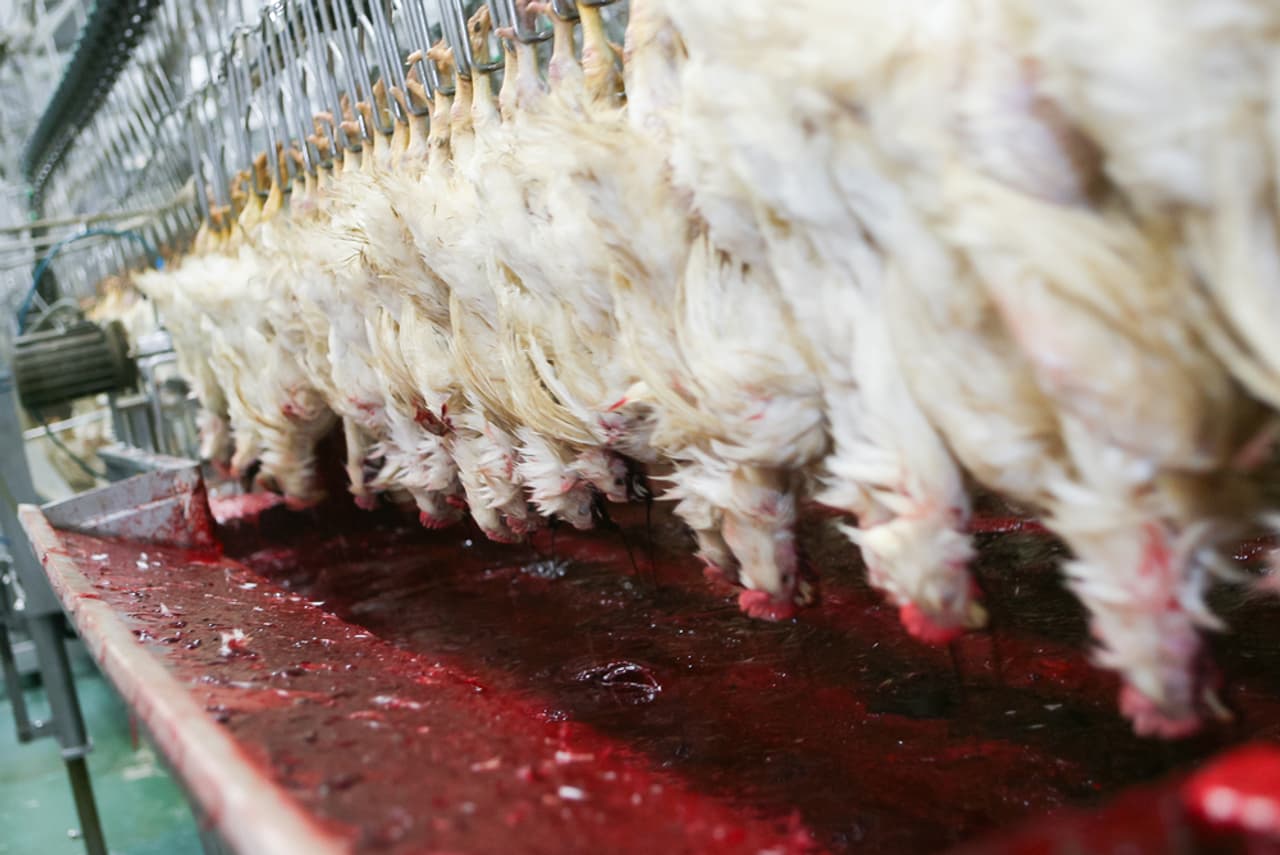
Action needed, say campaigners
But US campaigners said the findings offered an unprecedented insight into standards at some large meat factories, which are rarely detailed in public.
“The US meat industry has a responsibility to clean up its act”, said David Wallinga, Senior Health Officer at the environmental advocacy group, the Natural Resources Defense Council, which obtained some of the documents passed to the Bureau. He said that the Pilgrim's Pride records detailed “numerous food safety violations”.
Others warned many other breaches may go undetected. Tony Corbo, senior lobbyist with the pressure group, Food and Water Watch, said: “While the inspectors are able to cite the plants for hundreds of violations per week, I am confident that they are not catching every instance of unsafe practices being committed in these plants.”
Meat hygiene inspectors interviewed by the Guardian agreed, stating that fast line speeds and other pressures in some plants meant it was “inevitable” that some breaches slipped through the net.
Sussex University’s Professor Millstone said the findings were worrying “because of the risks of spreading infectious pathogens from carcass to carcass, and between portions of meat. The rates at which outbreaks of infectious food poisoning occur in the US are significantly higher than in the UK, or the EU”, adding that poor hygiene in the meat supply chain is a “leading cause of food poisoning in the US.”
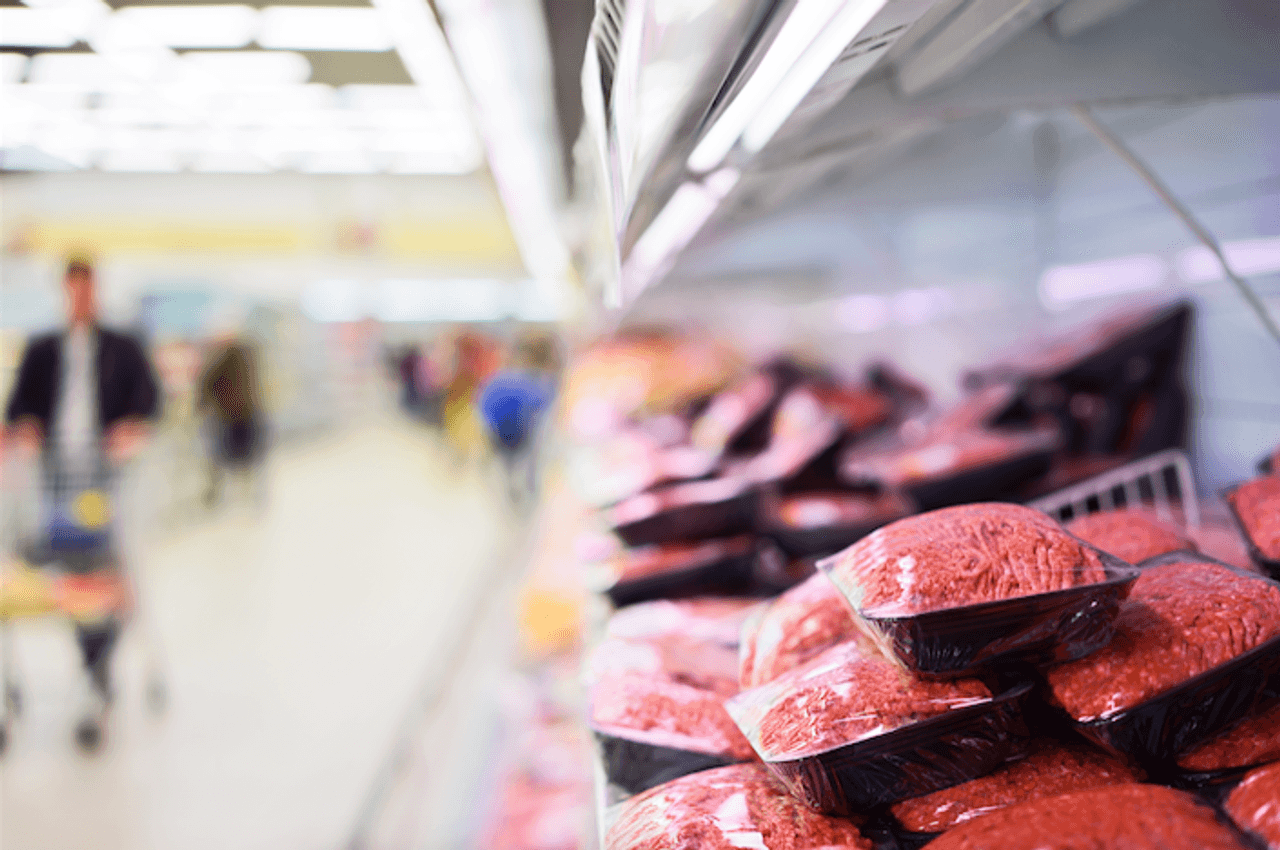
Risky meat
There is particular concern about salmonella, which causes around a million illnesses every year in the US. Campaigners warn that proposals to speed up production in the country's meat plants is particularly worrying.
Recent government sampling revealed 39% of minced chicken was found to harbour the bug during the tests, along with 14% of wings, legs and breasts. More than half of the samples they took from other parts of chickens were contaminated. Some pork products were found to have a 9% contamination rate, whilst 5% of raw ground beef was positive.
There are more than 2,000 different strains of the bacteria, but only some are harmful to humans.
The illness can cause gastroenteritis which can result in diarrhoea, stomach cramps, fever and sometimes nausea, vomiting and headaches. In some cases, the infection can spread and become invasive, causing infections of the bloodstream, bones, joints, brain or the nervous system, as well as other internal organs. Such infections can be life threatening.
Salmonella takes hold on farms and is found in the guts of poultry and livestock. Farm animals and birds can become contaminated with faeces containing the bacteria during transport to abattoirs, where slaughter and processing procedures can also spread it.
Meat hygiene inspectors said that preventing fecal contamination getting into meat is the primary concern, but that other hygiene or food safety lapses - including deficiencies in cleaning - can be a contributing factor.
FSIS records reveal there were 1,266 violations relating to controlling fecal contamination on carcasses at Pilgrim’s Pride plants, and 3,293 connected to the cleaning of surfaces that come into contact with food.
At the other plants we looked at there were 504 violations relating to contamination of carcasses in the period, the figures show, with 3,161 linked to inadequate cleaning.
Fecal contamination and poor cleaning were highlighted during an FSIS investigation into a serious salmonella outbreak linked to poultry meat which began in 2013 and made more than 600 people ill, of whom more than 200 were hospitalised.
At a meat plant linked to the outbreak, FSIS investigators noted “multiple regulatory non-compliances” for ‘insanitary conditions”, including 12 “findings of fecal material on carcasses” . These included some that the reports said had occurred just prior to illnesses first being reported.
Officials also highlighted “poor sanitary dressing practices, insanitary food contact surfaces, insanitary non food contact surfaces and direct product contamination” along with other factors, concluding that the plant concerned had failed to maintain standards and subsequently produced poultry that may have been “injurious to health”.
Keeping equipment, surfaces and other areas of meat plants clean, in particular those coming into direct contact with food, is a key part of combating the spread of bacteria, which can survive in insanitary conditions.
At another meat producer in Washington State, knives, tables and other items were found to be contaminated with salmonella during an investigation into a major 2015 outbreak which made at least 150 people sick in the area.
Campaigners say current proposals to allow some US meat plants to increase slaughter line speeds could exacerbate the problem, leading to more contaminated meat.
The roll out of a new system allowing poultry processors to increase line speeds was recently put on hold, but similar proposals in the pork sector are currently being considered. Under the new plans, pork producers would take over some inspection duties themselves, dictate their own food safety plans, and be free to increase line speeds without any cap.
Food and Water Watch analysed food safety and hygiene violation records for five pork processing plants that took part in a trial of the proposed system, and compared the results to five other plants operating in a traditional way. The records spanned 2012 to 2016.
Its analysis shows that 84% of all violations relating to compliance with food safety plans occurred in plants taking place in the trial, along with 73% of carcass contamination breaches, and 61% of violations relating to equipment sanitation.
“We believe that this new system will increase the risk of unsafe products being placed into commerce”, said Tony Corbo, from Food and Water Watch. “Companies will be permitted to develop their own food safety plans and identify what they believe the pathogen of concern is. So, salmonella might not be the pathogen they select to control or eliminate. FSIS will not require the companies to submit plans in advance for review and it could be years before the agency realises that the food safety plans might not be valid, putting consumers at risk.”
Kath Dalmeny, chief executive of the UK food group, Sustain, said: “The US has already warned us that we will need to lower our food standards in exchange for a quick trade deal, but we need to fight this hard.”
She added: “In recent years, the UK meat, dairy and egg industries have improved food safety; so we should all be alarmed about any trade deal that opens up our market to products that undermine this progress.”
However, FSIS defended the proposal. Maria Machuca, spokeswoman for FSIS, told the Bureau: "Over the years, FSIS has learned a great deal about bacteria and the link to human illness, much of which cannot be spotted by inspectors standing in one place along a conveyor belt.” The body is proposing a different approach, whereby: “FSIS inspectors would continue to conduct 100% carcass-by-carcass inspection; the plant employees would make cuts and present the carcasses and parts to FSIS inspectors for inspection. Under the proposal, inspectors would conduct more offline food safety tasks that place inspectors in areas of the production process where they can perform verification tasks that have direct impact on, and are the most important to ensure food safety."
She added that data showed that the body was continuing to document non-compliance and take action.
On increasing line speed, she said: "FSIS is requesting comments on the effects of faster line speeds, but under the proposed rule, establishments would be required to maintain process control to ensure that safe and wholesome meat is produced. FSIS inspectors would continue to have the authority to slow and stop the line to ensure food safety requirements just as they do now."
CLOSING THE SALMONELLA LOOPHOLE
The salmonella risk in the US is heightened by a controversial loophole which means US producers could potentially knowingly allow meat containing salmonella into the human food chain. The bacteria isn’t classified as an “adulterant” in US law. This is in contrast to some other food poisoning germs, such as E.coli 0157. It means that producers have no obligation to withhold contaminated batches.
Consumers groups and some experts want the law changed, and although several attempts, including legislation that would re-classify salmonella as an adulterant, have been made in recent years, the efforts have been defeated.
Salmonella causes around a million illnesses per year in the US. Poultry products have been estimated to account for around 220,000 cases annually, with 4000 hospitalisations and 80 deaths. Beef and pork have been linked to approximately 65,000 illnesses, 1000 hospitalisations and 20 deaths per year. Rates of food poisoning from campylobacter, another pathogen, are also increasing in the US, with 1.3 million cases every year. Rates of the same illness here, according to the UK food group, Sustain, are currently falling.
In the UK, the number of officially recorded human illnesses caused by salmonella remain relatively low, with just under 10,000 laboratory confirmed cases in 2016. Officials say that for every case picked up by national surveillance, another five could take place in the community - potentially taking the figure to around 50,000 - although not all of these would be linked to contaminated meat.
Sarah Sorscher, of the Centre for Science in the Public Interest, which has unsuccessfully petitioned the US government twice to ban some forms of salmonella in the meat supply chain, said such efforts failed “because fixing the problem would require substantial changes in how these foods are produced, right down to the farm level.”
She added: “Industry is concerned about the potential costs of these changes, and pervasive anti-regulatory sentiment in Congress means industry groups do not have to lobby very hard to keep these bills from moving.”
Bill Marler, an attorney who has represented many victims of food poisoning outbreaks in recent years, said classifying salmonella an adulterant would dramatically reduce human cases: “One only needs to look at the success we have had in the beef supply after E. coli was deemed an adulterant [in 2011]. 90% of my work in the late 90’s and early 00’s was E. coli cases linked to red meat. Now it is near zero. That is a success of the government setting a standard and industry meeting “
But the US meat industry and some experts say that enacting a zero policy for salmonella, in the same way as E.coli, isn’t feasible.
Eric Mittenthal of the North American Meat Institute, said that it was important to acknowledge that it was difficult to eradicate salmonella completely on raw products, although meat companies would like to reduce it as far as possible. He said: “That is why the government’s approach has been to require plants to take steps to reduce Salmonella on raw meat and poultry products...In the case of salmonella, plants use careful sanitation procedures and what we call interventions, like carcass sprays and washes and steam pasteurization cabinets, to reduce all bacteria, Salmonella included, to the lowest levels possible."
When scientists from 16 countries wrote a report on chicken and salmonella, he added, they found that it is impossible to eliminate it completely. “Instead, the group recommended risk assessments and performance objectives linked to human health outcomes. In other words, setting goals of lowering contamination by removing risks, but ultimately accepting that Salmonella will never completely go away.”
Professor Glenn Morris, of the Emerging Pathogens Institute at the University of Florida, said that whilst it was possible for the US meat industry to bring down salmonella rates, there was a need for greater incentives. “Industry does have ways to drive down salmonella rates but like so many things it costs money. It’s about cost and profit versus the public health drive."
He added that reducing salmonella to zero levels - or reclassifying it as an adulterant - “is a prayer that will never happen” in the current political climate.
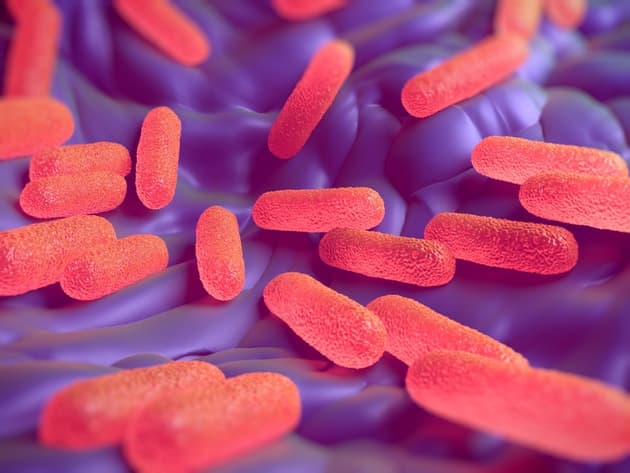 Stock image of salmonella bacteria
Photograph: Shutterstock
Stock image of salmonella bacteria
Photograph: Shutterstock
Additional reporting by Elisabeth Mahase.
Header image: a poultry worker in Montgomery, Alabama repeatedly hangs recently slaughtered, de-feathered chickens on the constantly moving poultry line of a meat plant, from an investigation of working conditions by Oxfam America. By Earl Dotter/Oxfam America




